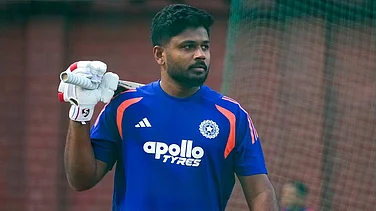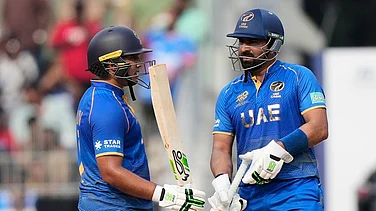Let’s first set the record straight, once and for all. Cricket is the greatest game invented by man. And nothing else even comes close. Does any other game make so many demands from its players? It asks for as much athletic ability as soccer but can you ever imagine Diego Maradona being a great cricketer? (OK, now imagine what wonderful soccer Garfield Sobers could have played. Thank you, you can get the glaze out of your eye now.) Cricket requires the physical courage of a bullfighter: picture yourself standing at the crease as Malcolm Marshall comes charging in, and you could be wearing the body armour of American football plus Robocop for all he cares, and for all the difference it will make to your mental well-being when he’s only 22 yards away from you. Or standing at forward short leg when Sachin Tendulkar is batting. Wouldn’t you prefer the primal rage of the goaded bull?
Cricket is the only sport where a captain is essential. In all other field games, the captain is simply an acknowledgement of seniority, a tip of the hat at a player’s excellence. But apart from that band round his arm and the right to call when the referee tosses a coin, he is just another member of the team. As for the strategy part and the motivation part and the thinking bit, for all those things that are supposed to define leadership, there’s a coach howling himself hoarse on the sidelines. Not so in cricket. Out on the field, cricket requires a leader of men who, ideally, should combine the strategic mind of a Rommel with the ruthless innovative powers of a Gary Kasparov and the motivational skills of a Mohandas Karamchand Gandhi. In which other game could a mediocre athlete but a brilliant psychoanalyst be one of its greatest captains, and the most valuable member of his team? I speak, of course, of Mike Brearley. (If you are doing an MBA, give it up now, for all you need to read is Brearley’s The Art of Captaincy.)
In September 1981, one S.A. Nicholas wrote the following letter to The Guardian : "On Friday I watched J.M. Brearley directing his fieldsmen very carefully. He then looked up at the sun and made a gesture which seemed to indicate that it should move a little squarer. Who is this man?" Could any other game have caused such awed metaphysical puzzlement?
To be sure, every cricketer does not have to possess the skills necessary to be a captain. But he does need a sailor’s deep knowledge of meteorology and wind conditions, a farmer’s understanding of soil types and an aircraft designer’s expertise in aerodynamics, especially the physics of a round object travelling at great speed through air. In Test matches, depending on the situation, he requires the raw energy of a cheetah on the hunt or the patience of a python. In one-day matches, you even need the mathematical ability to figure out how you are doing vis-a-vis the required run rate and how many overs your best bowlers have left to bowl compared with the number of overs left in the match. And nowadays, you could also do with a dash of Buddha-like serenity as you take stance and the slip fielders mutter about the questionable legality of your birth and your relationship with your sister.
In other words, it’s tougher—much, much tougher—to be a good cricketer than to be any other sort of sportsman.
And as for us lesser mortals who have been deprived of the brains of a Brearley and the nerves of a Steve Waugh and the grace of a David Gower and the integrity of a Frank Worrell and the athletic ability of a Jonty Rhodes, well, which other game allows its fans so much scope for analysis, so myriad a number of legitimate viewpoints to debate, so many statistics to crunch and interpret? There are too many damn variables and nuances to this game. As we all should know by now, life is a pale imitation of cricket.
Could the British have built the largest empire in history without having invented the game of cricket? I don’t need to answer that. It’s an extremely rhetorical question.
And every four years, all these generals and meteorologists and physicists and warriors come together for the greatest celebration and reaffirmation of their science and art and craft. They are all mad alchemists, except that in each of these four-yearly conclaves, some group of druids or the other actually manages to get their gloves on the philosopher’s stone.
Unlikely? Oh, so you are the genius who bet on India in 1983 and Pakistan in 1992 and Sri Lanka in 1996? And if you think Australia will just rampage their way to the Cup, remember the 1992 tournament, where the Aussies were dead certs, and on home ground? In fact, the dead-certness changed within a few days and till the near-death overs of the semifinal between New Zealand and Pakistan, when a fat, bloodshot-eyed youth called Inzamam-ul-Haq ambled out to bat, the handing over of the Cup seemed to be mere formality as far as New Zealand was concerned.
As for the next (supposedly) best bet for this World Cup, South Africa, remember that no host country has ever won the Cup. Unless you count Sri Lanka, which was the third host in 1996. I may be mad about cricket but I am not enough to suggest that the Host No. 3 of this World Cup, Kenya, has a chance, but consider the fact that in 1996 Australia refused to play in Sri Lanka, and it’s still a possibility that the same could happen in Zimbabwe, the second host country. Which true cricket-lover would mind Andy Flower winning the Cup?
As for the continent pretending to be a country in which we live, I suggest a simple exercise. In this book, we who work for Outlook and are bigger fans of cricket than anyone else on earth and the best analysers of the game and whatever conclusion we reach is after considerable argufying on any cricketing issue and are able to print after the blood has been washed off the floor and our jaws rewired so we can manage to haltingly dictate our pieces, and if you happen to dispute the fact that we understand cricket better than you, we will never publish your letters to the editor, who assured us that he understands the game even better than we do (in fact, that’s why we agreed to work for him)—yes, to cut a long story short, we have selected the 10 greatest Indian one-day victories.
Now get on the Net, or go through your files of yellowed clippings, whatever, and verify the following simple fact. A month before each of these splendid triumphs, the Indian team was in the doghouse. They were the worst no-hopers since those stupid alchemists who tried to make gold out of iron. And then, every time, something happens.
Life happens.
You thought the World Cup was about cricket.



























